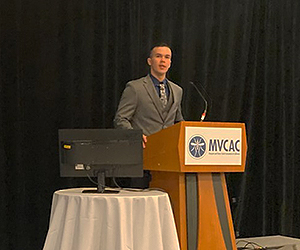Public health Ph.D. student Ryan Torres presented research at last month’s Mosquito and Vector Control Association of California Conference in San Diego that could be foundational for future mosquito-control efforts.
Torres’ presentation, “Wolbachia Infections in Mosquitoes of Merced County,” is based on a collaborative project with the Merced County Mosquito Abatement District. The research is funded by a Center for Disease Control and Prevention (CDC) training grant with his faculty advisor, Professor Andrea Joyce.
The invasive mosquito Aedes aegypti — known as the Zika mosquito — has expanded its reach in California and was found in Merced County in 2017. A new pest control technique, Wolbachia-infected mosquitoes or “sterile male releases,” has been used in Fresno and globally to reduce mosquito populations and to prevent vector-borne diseases — diseases that result from infections transmitted to humans and other animals by blood-feeding anthropods.

Torres’ current project examines Wolbachia strains in mosquitoes in Merced County and provides data on whether each species is naturally infected with Wolbachia.
“It has been truly rewarding to work on this project. Many of the mosquito species we have in Merced County can transmit vector-borne disease,” Torres said. “There are not vaccines to protect us against many of these diseases, so vector control is particularly important to reduce risk to humans.”
Conference attendees included the CDC, California Department of Public Health, the Department of Pesticide Regulation, and numerous mosquito- and vector-control districts and agencies.



